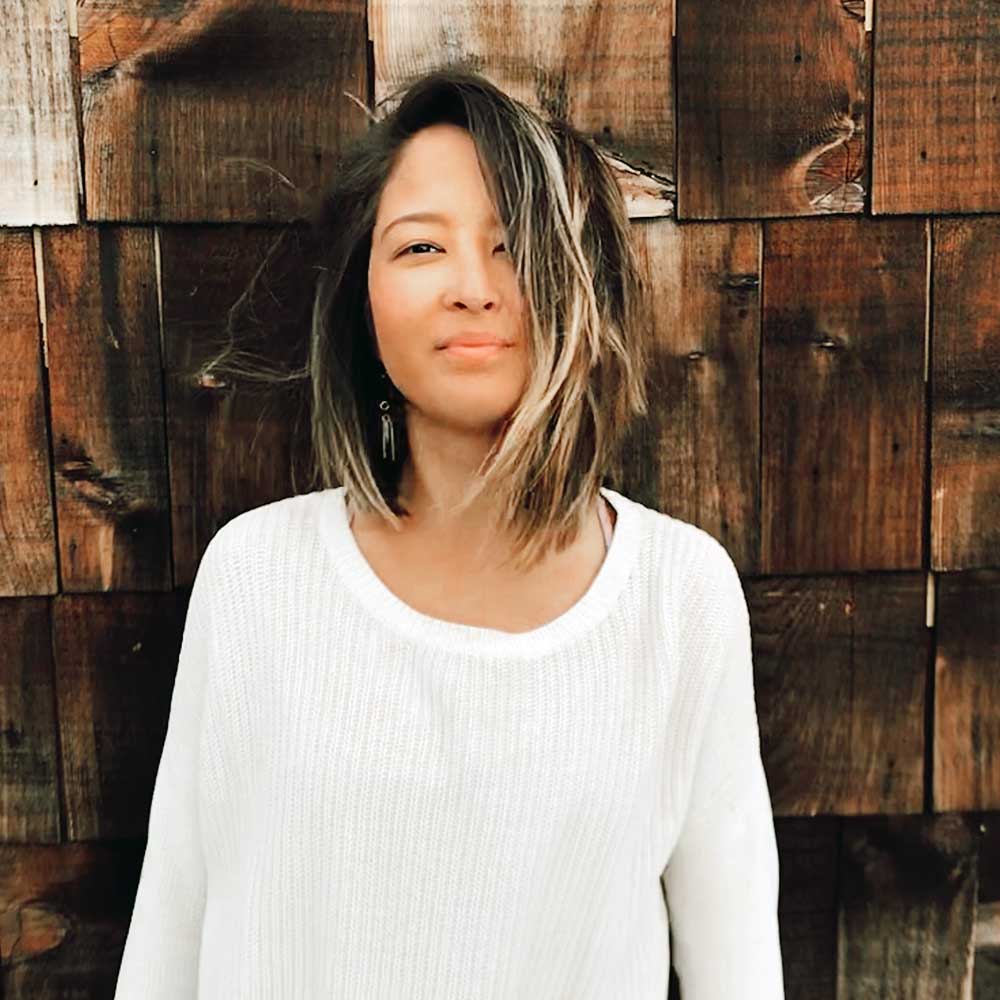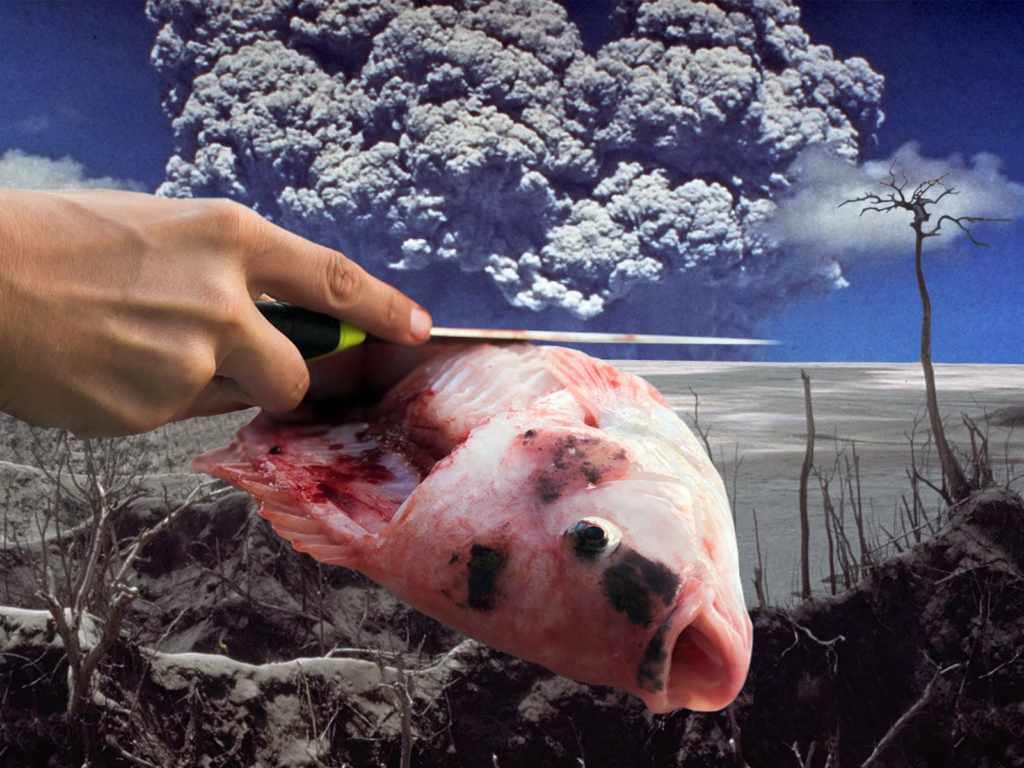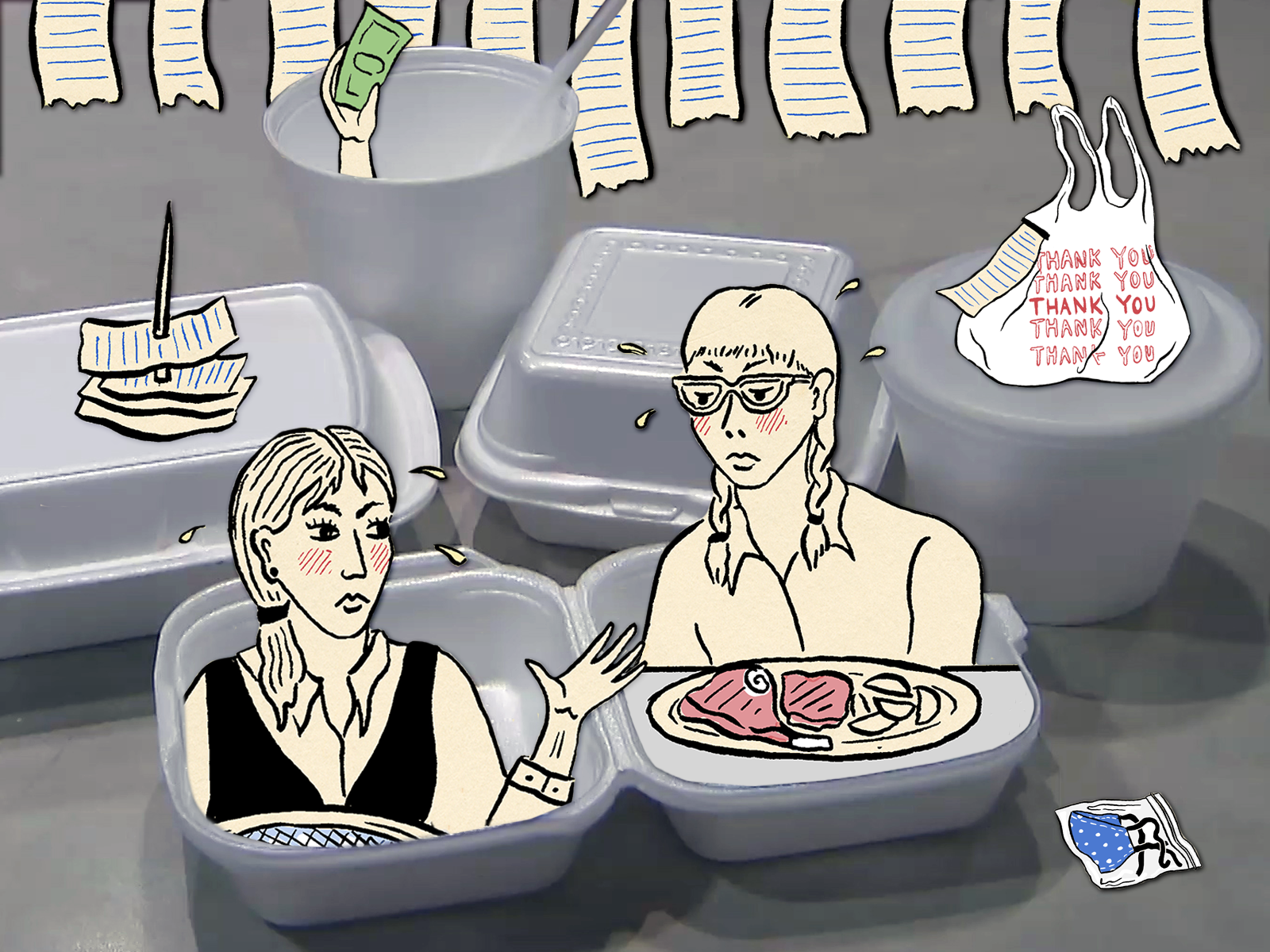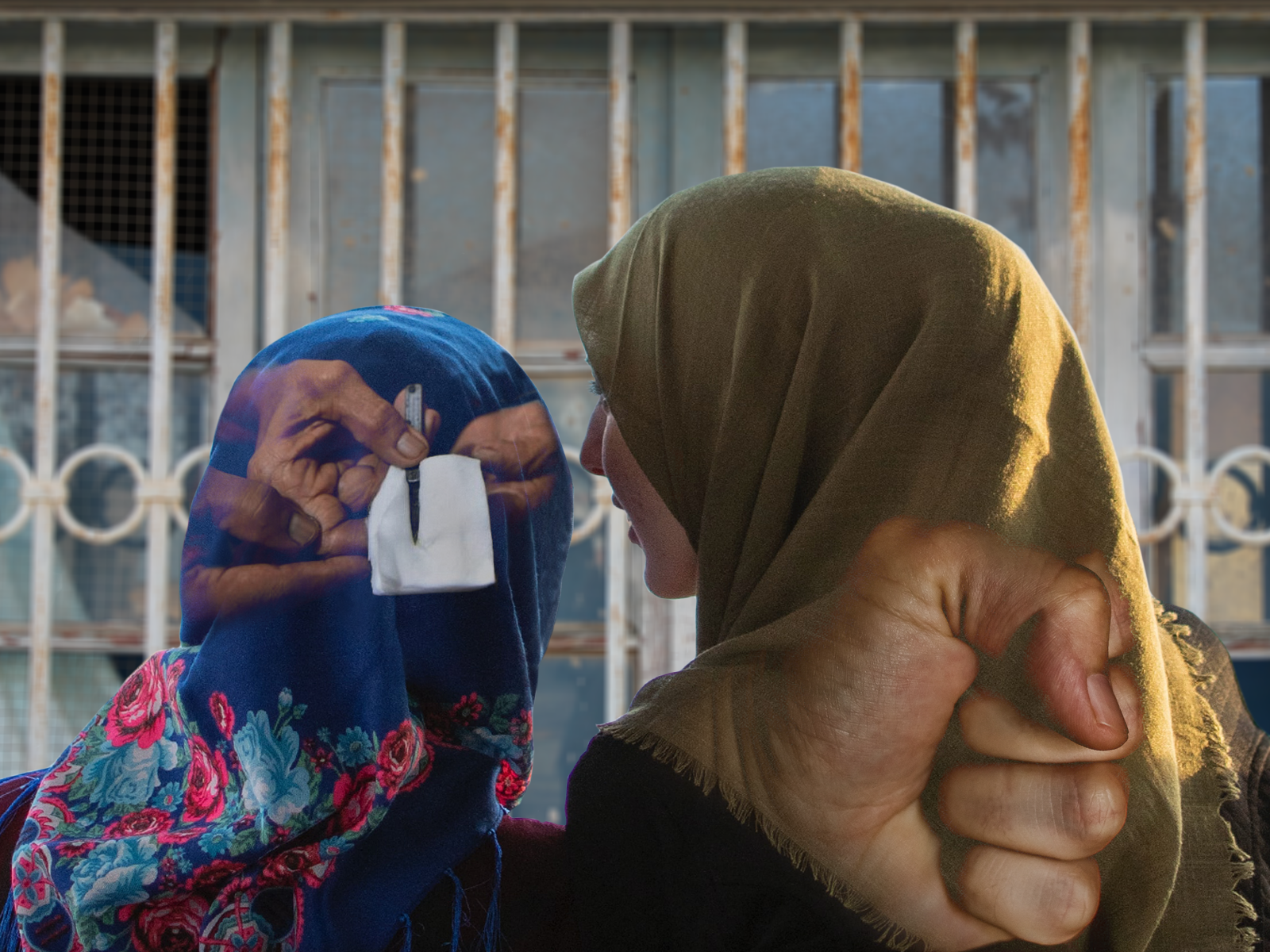The first time I watched you kill a fish, you were methodical and emotionless, striking it in one blow. We stood in the kitchen, wearing matching house slippers and long skirts. You were thirty one, I was seven. You don’t want them to feel stress, you explained, when I asked if doing this bothered you. They only suffer. They are drowning in air.
I loved watching you work: how your hands split the fish into harmonious segments with precise slits to the skin. Your hands never shook once. You excavated the guts and organs of the tilapia, blood spilling into the sink, and slid a knife into the membrane behind the head, severing its spine. This was second nature to you. You grew up doing this, and you made sure I knew how to do this too: how to skirt the rib cage and lift the filet of mostly boneless meat from the spine. How to eat with my hands.
I’m writing to you because talking has never been easy for us. I’m writing to you, despite knowing that you’ll probably never read this letter. I’m writing to go back to fifteen years ago, when you, Chance, Nanay, and I would fly across the Pacific Ocean to the Philippines every spring to see all our cousins and help prepare for Holy Week and all its activities: the float building, the weekend processions, the big dinner at the end of the day. At fifteen, I spent the entire plane ride there engrossed in my copy of the Contemporary American Poets anthology that Daddy gave me, each female poet marked with a creased corner. I barely looked up from this pocket-sized book, as I came to the life-changing realization that female emotion could be a source of strength, not weakness. For better or worse, you’ve instilled in me a cultural stoicism, a kind of self-preservation, where it’s safer to keep your feelings close, deep down inside for no one else to see. Don’t lose face, you said to me as we approached airport security in the Philippines, your eyes cooly assessing the green uniformed men. Don’t draw attention. By saying nothing, you were saying everything.
At takeoff, I would watch you make the sign of the cross over your chest, your eyes closed, your breath caught in your throat until the plane lifted off the ground. You and I both do this in furtive, compulsive gestures at takeoff, even to this day, as if it will protect us from falling out of the sky.
I always believed those precious weeks of travel and homecoming were what sustained you for the rest of the year. You filled large, cardboard balikbayan boxes as if you planned to never come back: stacks of clothes folded into tight little squares, packages of ramen noodles and instant meals taped together, rows of granola bars and miniature tubes of toothpaste bundled with soft stuffed animals. You filled every crevice. Because my room was in the basement, next to where you set up your entire packing station, I’d begrudgingly come out and help you balance each box on the back of the bathroom scale to make sure each one weighed precisely fifty pounds. By pure intuition, you predicted the weight of each box to the nearest half-pound. Together, we taped and roped each box shut until they lined the wall in neat rows. Once the balikbayan boxes were packed, I knew you were ready to go home.
In the Oxford Dictionary, the word superstition originates from the Latin word, super-stare, perhaps from the idea of standing over something in awe. Or perhaps the word emerged from people’s excessive fear of the gods, from their overzealous attempts to find truth others couldn’t see. When I call someone superstitious, I think of black cats, broken mirrors, and years of bad luck. But when it comes to your superstitions, Mama, I think of your indomitable gut. I think of the stories handed down to you, and then to me, and how you don’t even really believe in half of the rituals you insist we follow or perform on our behalf. Better to be safe than sorry, you say.
You believe in caution, while Daddy, who comes from a long line of stern and pragmatic German men, believes in answers. Daddy is a numbers guy: he likes data, facts, problems that can be solved rationally. Whether skydiving or teaching a class of graduate students about finance, he bases his entire understanding of life around precise calculations that determine the risk and trajectory of every movement he makes. You both believe in backup plans. I fall somewhere in the middle.
I turned 31 this year, the same age as you were when you, Chance, and I moved out of the ranch-style Concord house with Daddy and into the red-bricked house on Sanoma with our new step-dad Junks. I tell you all of this, knowing you probably don’t remember the details of your life any better than me. I’m your memory, you tell me all the time.
When the Spanish conquistadors arrived on the shores of Luzon, they brought legions of Spanish Catholics and demanded new customs, new languages, new names, new ways of owning the land. And when the Americans drove them out in the Spanish-American war of 1898, the Philippines became another trophy for the Americans to keep — like Guam and Cuba and Puerto Rico — during their occupation, they brought in English and fast-food chains. But just because the Philippines finally gained its independence in 1945 didn’t mean the country could forget its own Westernized past, didn’t mean it could or knew how to peel away its own skin and tissue and bone when the soldiers left on boats and planes.
The practice of kamayan, our Filipino tradition of eating with bare hands, existed long before even the Spanish colonization in the sixteenth century. This was our literal, tactile way of connecting with the food that nourished us, and the land from which it came. If food is at the heart of our family, then rice is the body and fish is the blood.
But even after the Spanish and the Americans left, their mentality and beliefs were still entrenched in the very way that food was eaten. Seen as a poor and barbaric way of eating by Western standards, kamayan often only took place in the safety of the home, never in public. Or if it did, it was only for holidays or to pay homage to our cultural ancestry. Many Filipinxs today eat using a spoon and fork, even at home. Colonized by our own hands, by the very utensils we used to put food into our mouths. Kamayan was our perceived weakness, but it was also our strength, our way of feeding ourselves, of putting flesh to flesh.
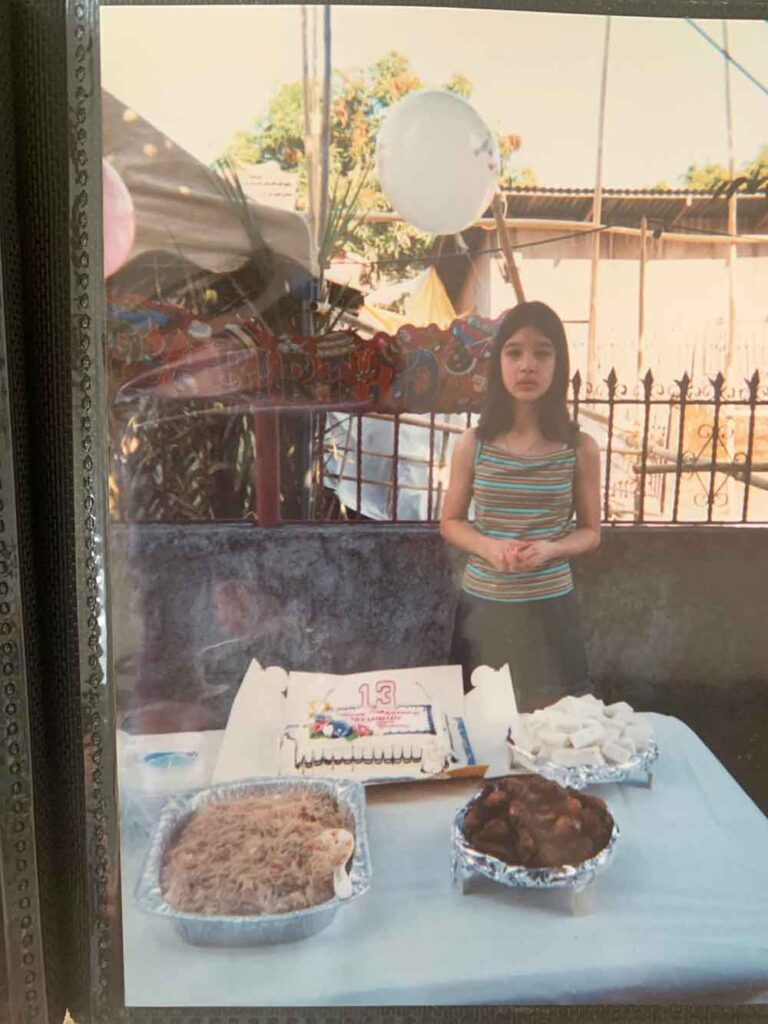
At the end of March 2002, a week before I turned thirteen, the four of us (you, Nanay, me, and Chance) landed in the Philippines, where temperatures soared into the hundreds. Outside Manila Airport, it was a sea of honking cars and jeepneys, and then barriers and fences, where arms and legs swayed back and forth through metal rungs. People approached me and asked to touch my arm, as if to verify I was real. I was their mirage.
Through the dust and hazy smog, we drove from Manila to Subic,
where the monochromatic landscape stretched on as far as I could see. Every once in a while, we passed ripped-up patches of earth, a tangle of roots in the air. Chimney tops marked where buried homes lay beneath. Nanay and I sat in the far back of the van with the large balikbayan boxes, while five-year-old Chance sat on Ate Senny’s lap and peered out the van window. You sat in the front seat with Kuya Roy, who had driven the five hours down with Ate Senny to pick us up and then turn right around to drive the five hours back.
Anak, whole town covered. They never recovered it, Nanay said, sucking on her teeth. And you see it cover one foot of my house. You see. When she tipped her head back, the lines of her brown face melted away and she looked just like you, thirty years younger, rather than my grandmother. You two seemed like sisters. Spidery lines scattered across her hands as she held mine in her lap. She curled into the space next to me and slept for most of the ride.
The land was unfamiliar to us all, swathed in an impenetrable blanket of dust and sand. I couldn’t imagine that life existed here before Mt. Pinatubo erupted on a balmy June afternoon in 1991. You pointed out the has-beens of landscape as we drove: flattened bridges; cars buried nose-deep in white sand in front of an abandoned US base. The US never came back to rebuild the base. Pinatubo made their decision to leave easy. Scientists had predicted the eruption, saving millions of lives, but there were still over eight hundred deaths, many from the relentless mudflows that continued for months on.
You once told me this story: Mt. Pinatubo created its own weather system when it erupted, and if that weren’t bad enough, Typhoon Yunya’s storms landed on the same day, triggering floods of rain and ash. Your brothers watched from the Wawandue house as surrounding neighbors’ roofs caved in from the heavy, wet ash, and so they took action. They shook off some pots and pans and wore them like helmets to shimmy up to the roof and clear the debris.
As a child, my obsession with volcanoes began with the colorful science books that showed the moment of explosion, the dazzling unleashing of power and of what lies beneath. Everything comes to light. I liked that volcanos, of all the natural disasters I used to look up in books, were the angriest. We never talked about our anger. I hoped that the sheer act of traveling would make you happy again.
The road we were on, which used to be a highway, had no lines, no lights, no way to differentiate the lanes other than the tracks from the other cars in front of us. Nothing to stop us from veering off this makeshift path and straight into the colorless abyss around us. The past hour of listening to fragments of conversation in Tagalog had felt a little like this, meandering on a road that may or may not have been a road. Lost. I was desperate to join in, to say anything, but too ashamed to admit I didn’t know the majority of what was said. Anything I tried to say dried up on my tongue. I added to the conversation in a flurry of nerves — one word (ano ba?) or another (opo!) — and felt my heart lurch forward with the van.
Later, we exited from the main highway, diverted by washed-out, muddy roads through what used to be the city of Pampanga. Subic was twenty miles from Mt. Pinatubo, but Pampanga was even closer, devastated by volcanic sediment that slid down and zipped the town closed. Kuya Roy drove slowly through a thin, brown river. People walked alongside us in ankle-deep water, their faces covered with bandanas or t-shirts, only their sunglasses visible.
Ate Senny was the most confident with her English, but when she spoke to me directly, she covered her mouth with her hand: Pampanga! Many events here before. Many tourists.
Why would anyone stay here? I asked. In a low, cautious voice, Ate Senny answered, They didn’t have no place to go. She feared eavesdropping spirits. They lived all around us. Spirits thickened our family’s blood. This is their home as much as it is ours.
Towards the center of the city, someone built an improvised market against what used to be a church, and a growing congregation of people gathered around it. We pulled over, all of us sweating from the broken air-conditioning. The heavy heat soaked through my clothes. You wiped Chance’s sweaty forehead with the corner of your shirt, and I spat out dust.
Nanay and I approached one of the vendors and noticed booklets and trinkets that featured saints and famous Filipinos. Replica newspapers from the 1930s touted a regal photo of Apo Iro’s as the Manggagamot ng Pampanga! The faith healer of Pampanga! They sold glass vials with a few drops of holy water for less than ten cents apiece. I purchased a miniature saint of Buen Voyage, the protector of travel, and put it in my pocket for safekeeping.
I shaded my eyes from the sun and grit kicked up by passing tricycles. You wiped your eyes and went ahead with Ate Senny, who carried Chance, to get a closer look at the interred church, its pointed roof the only thing left. Even in its destruction, we revered Pinatubo, our reminder of the violent potential of the world around us.
When I asked you about the devastation of Mt. Pinatubo, you said you felt no guilt for waiting to visit (What am I supposed to do? Fight Pinatubo? I send them money, but I’m here. That’s there). The timing to go home could not be more perfect, though. You needed space from your dissolving marriage, and I learned from you, first-hand, how to compartmentalize pain and recovery, find the sort of healing that comes from creating physical distance between yourself and everyone you know. You said that Daddy was not comfortable with me traveling there as a baby (Blame your dada! He’s scared of germs and mosquitoes — you know how he is), so you waited until I was old enough and we could leave. The Philippines — travelling vast distances across the world — became as much of my safe haven as it was yours. We were always leaving the men we loved.
As a child, I watched you withdraw from Daddy, and later from my stepfather, Junks, countless times. For a long time, I didn’t know this withdrawing had a name, I just knew when it was happening. He simply did not exist to you anymore. No amount of talking or begging or pleading could get you to acknowledge him. I’ve heard you call this “tampa,” or giving someone the cold shoulder. But tampa went much deeper than that, had something to do with love and withholding, with resentment and silent protest, with reclamation of the Filipina body and power.
You’d fight, you’d tamp down, you’d last as long as you could until you exploded. Things went back to normal. Things built up again. You’d fight, you’d tamp down, and the cycle started over. I didn’t know how long we were supposed to withstand being like this, how long we were supposed to go without speaking our pain. This was the way Filipina women, for centuries, had been taught how to love and to be loved.
We don’t know how to talk about our anger. This much was clear to me, at sixteen, when I watched you fling a trash bag full of my clothes over your head and across the front lawn of the house on Sanoma. You said nothing. Another armful of my clothes sailed out the door. My cheerleading jacket landed in a bush. Junks tried to stop you from throwing another armful, only to receive an elbow to the gut.
She wants to go? Listen to nobody? Then let her go! You slammed the storm door closed. You wouldn’t even look at me. I wanted to disappear out of my skin and into the dirt. You kept asking where your little girl went, why the cute and bookish and talkative preteen you once knew was gone, replaced by a distant and thorny sixteen-year-old daughter. You called me naïve; you said I let my boyfriend treat me like a prostitute.
I ran past you downstairs to see my room, where drawers were half-opened and my closet was emptied of most hanging clothes. Upstairs, you took plates from the cabinets, one by one, and began throwing them onto the kitchen floor. You broke the top of your favorite vase.
All of this because I wanted to stay out late with my high school boyfriend, and I came home late for curfew. At this point, we were having daily fights about how I wanted to spend my time outside the house; you wanted me with you, and I wanted to be anywhere else (Go be with your Daddy — your temper is worse than his huh!). Daddy said I wanted to know I was right, and I wanted you to know it too. I questioned your decisions and hammered you for any inconsistent rules because I didn’t understand why I had to be held to a different standard than anyone else I knew. All my white friends had laid back, white parents who allowed them to go out and party and stay out late, while you, my immigrant mother, seemed hysterical in comparison if I stayed out late. No one else’s parents policed their daughter’s body as strictly as you did. You even allowed Chance more leniency than I was ever granted. What did you know that I didn’t?
Before this fight, I didn’t know much about your life before raising two children in America. You would tell me a handful of stories, here and there, about skipping school or Lolo’s drinking or the time you climbed and fell from your backyard mango tree, but the stories always ended the same: I met your Dada. Maybe you will get lucky and marry an American too. I never considered that your strict rules and expectations and constant vigilance for your loved ones was your way of survival. You protected me.
Beneath Pampanga, a vault of manuscripts written by local writers is trapped under ash and rubble, an anastomosis of stories and lullabies we hand-sewed: a woman who gave birth to a fragment of porcelain that grew into the image of the Virgin Mary. An image that was carefully guarded and stored in pockets, handed down from mother to daughter, from aunt to niece. Supposedly, the hands it touched were emboldened with the ability to heal people. Nanay hummed this as she braided my hair, as we crossed over the buried city of Pampanga. She tied a thick rope plaited against my back, telling me very seriously: The woman who gave birth was her great-grandmother.
In the Philippines, I witnessed the aftermath: what the time-consuming process of loss and destruction and healing looked like, the jarring yet crucial role that volcanoes played in biology: as violent and deadly as volcanoes were, they were also ecological equalizers, the harbingers of mineral-rich soil that plants needed to grow. They razed the land; made space for the next generation of plants and wildlife and organisms to sprout. Maybe life on Earth even began with the help of these explosions.
We searched for ways to explain the unexplainable, and the deeper I dug into our family’s stories and the world that shaped us, the more questions and uncertainty science opened up for me. Part of me wondered if I would have been better off becoming a geologist as I planned in college, someone who excavates and explores the land’s origins and remains.
Mt. Pinatubo reminded me a lot of how our family operates: you talk around what you really want to say and simmer on every disappointment, every shoved-down feeling, everything you can’t take back, until there is nowhere to go but up: a rupture of the body.
